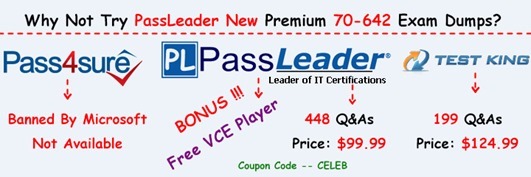What’s the secret of easily passing new 70-642 exam? PassLeader have been updated the 70-642 exam dumps with the newest exam questions. We offer the latest 448q 70-642 PDF dumps and VCE dumps with New Version VCE Player for free download to ensure your 70-642 exam pass. Now visit www.passleader.com and get the 100 percent pass ensure 70-642 braindumps!
keywords: 70-642 exam,448q 70-642 exam dumps,448q 70-642 exam questions,70-642 pdf dumps,70-642 vce dumps,70-642 braindumps,70-642 practice tests,70-642 study guide,TS: Windows Server 2008 Network Infrastructure, Configuring Exam
QUESTION 121
Your network contains an Active Directory domain. The domain contains a server that runs Windows Server 2008 R2. The server contains 10 shared folders. You need to be notified by email when users save .mp3 files to the shared folders. What should you do? To answer, move the appropriate actions from the Possible Actions list to the Necessary Actions area and arrange them in the correct order.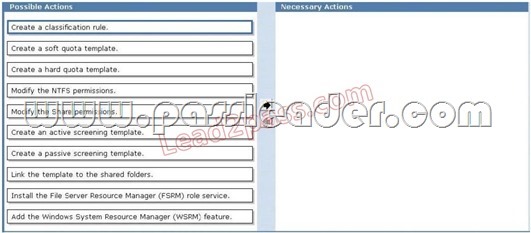
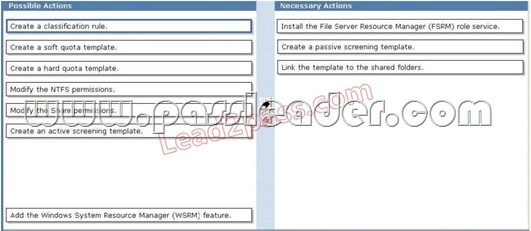
QUESTION 122
Your network contains an Active Directory domain. All domain controllers run Windows Server 2008 R2. The domain contains three domain controllers named DC1, DC2, and DC3. All of the domain controllers have the DNS server role installed. You create a new Active Directory-integrated DNS zone on DC1. You need to ensure that the zone is only replicated to DC1 and DC3. The solution must ensure that all zone replication traffic is encrypted. What should you do? To answer, move the appropriate actions from the Possible Actions list to the Necessary Actions area and arrange them in the correct order.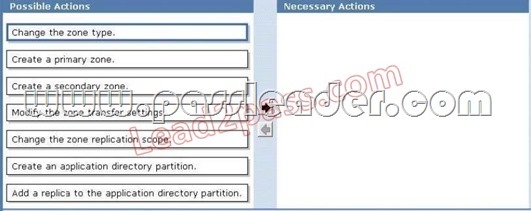
Answer: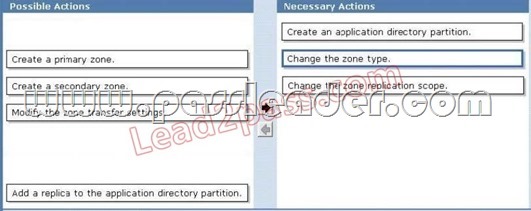
QUESTION 123
Your network contains a server named Server1 that runs Windows Server 2008 R2. Server1 has the DHCP server role installed. All client computer on the network obtain their network configurations from Server1. You have a client computer named Computer1. You need to configure Computer1 to use a different DNS server than the other client computers on the network. What should you do? To answer , move the appropriate actions from Possible Actions list to the Necessary Actions area and arrange them in the correct order.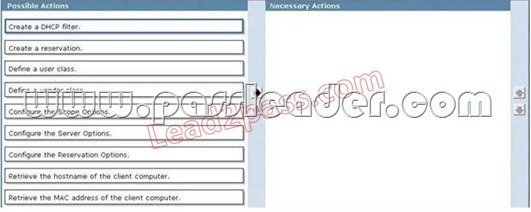
Answer: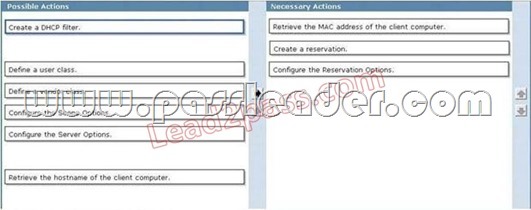
QUESTION 124
Your network contains 100 servers that run Windows Server 2008 R2. A server named Server1 is deployed on the network. Server1 will be used to collect events from the Security event logs of the other servers on the network. You need to define the Custom Event Delivery Optimization settings on Server1. Which tool should you use?
A. Event Viewer
B. Task Scheduler
C. Wecutil
D. Wevtutil
Answer: C
QUESTION 125
Your network contains a server that runs Windows Server 2008 R2. You plan to create a custom script. You need to ensure that each time the script runs, an entry is added to the Application event log. Which tool should you use?
A. Eventcreate
B. Eventvwr
C. Wecutil
D. Wevtutil
Answer: A
Explanation:
You can create custom events in an event log by using the Eventcreate utility. This can be useful as a diagnostic tool in scripts when you record an error or event directly into the logs without using VBScript or another language to log the event.
http://support.microsoft.com/kb/324145
QUESTION 126
Your network contains a server that has the SNMP Service installed. You need to configure the SNMP security settings on the server. Which tool should you use?
A. Local Security Policy
B. Scw
C. Secedit
D. Services console
Answer: D
QUESTION 127
Your network contains a server named Server1 that runs Windows Server 2008 R2. Server1 has the SNMP Service installed. You perform an SNMP query against Server1 and discover that the query returns the incorrect identification information. You need to change the identification information returned by Server1. What should you do?
A. From the properties of the SNMP Service, modify the Agent settings.
B. From the properties of the SNMP Service, modify the General settings.
C. From the properties of the SNMP Trap Service, modify the Logon settings.
D. From the properties of the SNMP Trap Service, modify the General settings.
Answer: A
QUESTION 128
You need to capture the HTTP traffic to and from a server every day between 09:00 and 10:00. What should you do?
A. Create a scheduled task that runs the Netsh tool.
B. Create a scheduled task that runs the Nmcap tool.
C. From Network Monitor, configure the General options.
D. From Network Monitor, configure the Capture options.
Answer: B
Explanation:
nmcap /networks * /capture LDAP /file c:\file.cap
If you want a timer add the following
/startwhen /timeafter x hours
QUESTION 129
Your network contains a single Active Directory domain. All servers run Windows Server 2008 R2. A DHCP server is deployed on the network and configured to provide IPv6 prefixes. You need to ensure that when you monitor network traffic, you see the interface identifiers derived from the Extended Unique Identifier (EUI)-64 address. Which command should you run?
A. netsh.exe interface ipv6 set global addressmaskreply=disabled
B. netsh.exe interface ipv6 set global dhcpmediasense=enabled
C. netsh.exe interface ipv6 set global randomizeidentifiers=disabled
D. netsh.exe interface ipv6 set privacy state=enabled
Answer: C
Explanation:
Starting Windows Vista, Windows Server 2008 and Windows 7, to prevent address scans of IPv6 addresses based on the known company IDs of network adapter manufacturers, Windows by default generate random interface IDs for non-temporary autoconfigured IPv6 addresses, including public and link-local addresses. A public IPv6 address is a global address that is registered in DNS and is typically used by server applications for incoming connections, such as a Web server. However, this can cause issues with some connection instances in which case you may need to disable this option.
To prevent Windows from using Random Identifiers:
1. Click Start ?search “cmd”, right-click and choose “Run as Administrator”. This should launch the command window withe elevated privileges.
2. Run the following command:
C:\windows\system32> netsh interface ipv6 set global randomizeidentifiers=disabled
At anytime later, you can enable this (if requierd) as follows:
C:\windows\system32> netsh interface ipv6 set global randomizeidentifiers=enabled
http://www.windowsreference.com/networking/disable-ipv6-random-identifier-in-windows-7-server-2008-vista/
QUESTION 130
Your network contains a server named Server1 that runs Windows Server 2008 R2. Server1 has the Routing and Remote Access service (RRAS) role service installed. You need to view all inbound VPN packets. The solution must minimize the amount of data collected. What should you do?
A. From RRAS, create an inbound packet filter.
B. From Network Monitor, create a capture filter.
C. From the Registry Editor, configure file tracing for RRAS.
D. At the command prompt, run netsh.exe ras set tracing rasauth enabled.
Answer: B
http://www.passleader.com/70-642.html
QUESTION 131
Your company is designing its public network. The network will use an IPv4 range of 131.107.40.0/22. The network must be configured as shown in the following exhibit.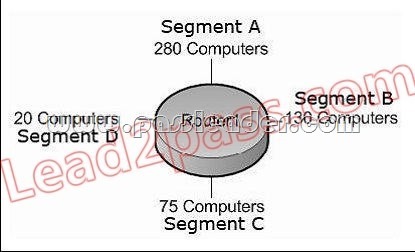
You need to configure subnets for each segment. Which network addresses should you assign?
A. Segment A: 131.107.40.0/23
Segment B: 131.107.42.0/24
Segment C: 131.107.43.0/25
Segment D: 131.107.43.128/27
B. Segment A: 131.107.40.0/25
Segment B: 131.107.40.128/26
Segment C: 131.107.43.192/27
Segment D: 131.107.43.224/30
C. Segment A: 131.107.40.0/23
Segment B: 131.107.41.0/24
Segment C: 131.107.41.128/25
Segment D: 131.107.43.0/27
D. Segment A: 131.107.40.128/23
Segment B: 131.107.43.0/24
Segment C: 131.107.44.0/25
Segment D: 131.107.44.128/27
Answer: A
QUESTION 132
Your company has an IPv6 network that has 25 segments. You deploy a server on the IPv6 network. You need to ensure that the server can communicate with all segments on the IPv6 network. What should you do?
A. Configure the IPv6 address as fd00::2b0:d0ff:fee9:4143/8.
B. Configure the IPv6 address as fe80::2b0:d0ff:fee9:4143/64.
C. Configure the IPv6 address as ff80::2b0:d0ff:fee9:4143/64.
D. Configure the IPv6 address as 0000::2b0:d0ff:fee9:4143/64.
Answer: A
QUESTION 133
Your company is designing its network. The network will use an IPv6 prefix of 2001:DB8:BBCC:0000::/53. You need to identify an IPv6 addressing scheme that will support 2000 subnets. Which network mask should you use?
A. /61
B. /62
C. /63
D. /64
Answer: D
QUESTION 134
Your company uses DHCP to lease IPv4 addresses to computers at the main office. A WAN link connects the main office to a branch office. All computers in the branch office are configured with static IP addresses. The branch office does not use DHCP and uses a different subnet. You need to ensure that the portable computers can connect to network resources at the main office and the branch office. How should you configure each portable computer?
A. Use a static IPv4 address in the range used at the branch office.
B. Use an alternate configuration that contains a static IP address in the range used at the main office.
C. Use the address that was assigned by the DHCP server as a static IP address.
D. Use an alternate configuration that contains a static IP address in the range used at the branch office.
Answer: D
QUESTION 135
You have a Windows Server 2008 R2 computer that has an IP address of 172.16.45.9/21. The server is configured to use IPv6 addressing. You need to test IPv6 communication to a server that has an IP address of 172.16.40.18/21. What should you do from a command prompt?
A. Type ping 172.16.45.9
B. Type ping 9.45.16.172
C. Type ping followed by the Link-local address of the server
D. Type ping followed by the Site-local address of the server
Answer: C
QUESTION 136
Your network contains a DHCP server named DHCP1 that runs Windows Server 2008 R2. All client computers on the network obtain their network configurations from DHCP1. You have a client computer named Client1 that runs Windows 7 Enterprise. You need to configure Client1 to use a different DNS server than the other client computers on the network. What should you do?
A. Configure the scope options.
B. Create a reservation.
C. Create a DHCP filter.
D. Define a user class.
Answer: B
Explanation:
http://support.microsoft.com/kb/240247/en-us?fr=1
QUESTION 137
Your network contains a domain controller named DC1 and a member server named Server1. You save a copy of the Active Directory Web Services (ADWS) event log on DC1. You copy the log to Server1. You open the event log file on Server1 and discover that the event description information is unavailable. You need to ensure that the event log file displays the same information when the file is open on Server1 and on DC1. What should you do on Server1?
A. Import a custom view.
B. Copy the SYSVOL folder from DC1.
C. Copy the LocaleMetaData folder from DC1.
D. Create a custom view.
Answer: C
Explanation:
The LocaleMetaData contains the description/display information that is missing, and when you “save all events as” you should chose to save and “display information”.
http://technet.microsoft.com/en-us/library/cc749339.aspx
QUESTION 138
You have a DHCP server that runs Windows Server 2008 R2. You need to reduce the size of the DHCP database. What should you do?
A. From the DHCP snap-in, reconcile the database.
B. From the folder that contains the DHCP database, run jetpack.exe dhcp.mdb temp.mdb.
C. From the properties of the dhcp.mdb file, enable the File is ready for archiving attribute.
D. From the properties of the dhcp.mdb file, enable the Compress contents to save disk space attribute.
Answer: B
QUESTION 139
You have a DHCP server that runs Windows Server 2008 R2. The DHCP server has two network connections named LAN1 and LAN2. You need to prevent the DHCP server from responding to DHCP client requests on LAN2. The server must continue to respond to non-DHCP client requests on LAN2. What should you do?
A. From the DHCP snap-in, modify the bindings to associate only LAN1 with the DHCP service.
B. From the DHCP snap-in, create a new multicast scope.
C. From the properties of the LAN1 network connection, set the metric value to 1.
D. From the properties of the LAN2 network connection, set the metric value to 1.
Answer: A
Explanation:
http://technet.microsoft.com/en-us/library/ee941100(v=ws.10).aspx
QUESTION 140
Your network contains a server named Server1 that runs Windows Server 2008 R2. Server1 is configured as a DNS server. You need to ensure that Server1 only resolves queries issued from client computers in the same subnet as Server1. The solution must ensure that Server1 can resolve Internet host names. What should you do on Server1?
A. Configure Windows Firewall.
B. Create a conditional forwarder.
C. Modify the routing table.
D. Create a trust anchor.
Answer: A
